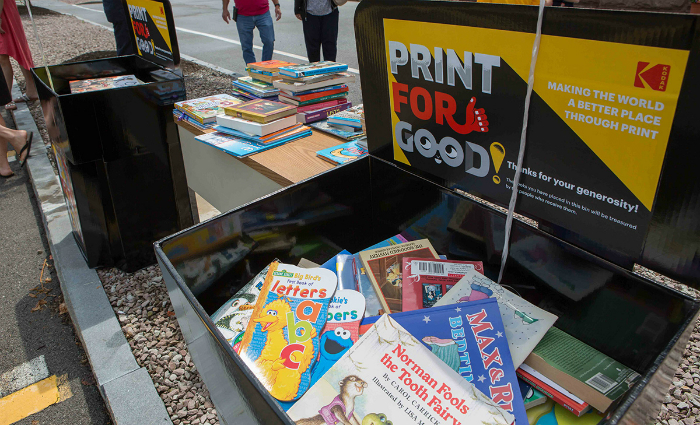Kodak has created a volunteer printer network that will produce thousands of children’s books and school supplies in to benefit some of the world’s most disadvantaged populations.
The company will use sustainable Kodak printing products such as Kodak Sonora process free plates. Richard Rindo, general manager sales, print systems division, vice president Eastman Kodak Company, says, “It’s wonderful to see printers signing up across the globe to participate in Kodak’s Print for Good programme.
“Participating printers are using Kodak’s sustainable technology to print and donate quantities of approximately 2,000 or more pieces of original children’s book titles or school notebooks. Those books and school supplies will be distributed in different geographies through on-the-ground partnerships with literacy organizations, schools and local non-profit groups.”
Last year, Print for Good placed more than 30,000 books and printed materials into the hands of thousands of children in communities throughout Europe, the United States, Latin America, Asia and the Middle East. The program also donated funds to help build a library in an all-girls Haitian orphanage; provided prayer booklets that were delivered to children in need during the 2017 Passover holiday in Israel; and hosted book-signing events and book drives spanning the globe
The Print for Good initiative also saw Kodak employees in the company’s facilities around the world volunteer to support their own community literacy initiatives, including participation in local school reading programmes.
This year, Kodak will also establish a new partnership with Room to Read, a global non-profit focused on literacy and girls’ education in low-income countries. Kodak has made multiple original designs and narrative children’s stories available to its Print for Good printer network in the coming months, both through the existing Room to Read archive and through a partnership with designer and children’s book author, Tad Carpenter. Carpenter will create an exclusive 18-page illustrated book, sponsored by Kodak, on the topic of sustainability – highlighting how kids around the world can help conserve water, save energy and reduce pollution.
Rindo says, “At Kodak, we view sustainability through the lens of the triple bottom line otherwise known as People, Planet and Profits. Promoting our sustainable portfolio, including our process free plates is good for the planet. Improving global literacy is good for people and the communities in which Kodak lives and operates. And, all this activity drives the value of print and the longevity of the print industry – in every sense, it’s Print for Good.”


